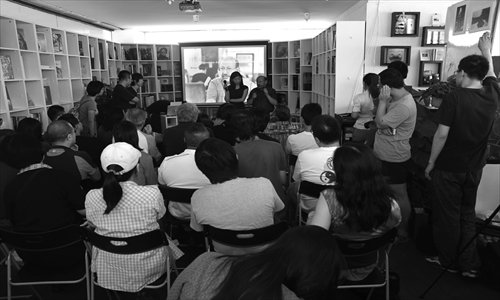Filmmaking’s new frontier

Making documentaries might have become easier for Chinese filmmakers over the past decade, but most have yet to fully embrace non-traditional storytelling methods. Although many have greater access to technology, not all have expanded their horizons to incorporate some of the creative styles used abroad.
The 9th Beijing Independent Film Festival recovered from a major hurdle at its opening on August 18, when power was cut during a screening, by resuming the following day at the Lixianting Film Fund headquarters in the Songzhuang Art Zone, Tongzhou district.
On Tuesday, film and media professor Brian Winston from the UK's University of Lincoln delivered a presentation at the Beepub Bookstore at the Songzhuang Art Museum titled "Breaking Boundaries: Exploring New Documentary Forms." Filmmakers and documentary enthusiasts from China and elsewhere were in attendance to learn more about the latest trends in foreign documentary filmmaking.
Winston kicked off his presentation with a bold announcement directed at budding filmmakers. "Today, I want to show you the range of possible forms and techniques for making documentaries that go beyond direct cinema, beyond observation, beyond fly-on-the-wall," he said.
The visiting professor's talk aimed to expose the predominantly Chinese audience to new methods of direction by showing specific examples from the UK.
The observational approach for documentaries is still heavily favored by filmmakers from the Chinese mainland, unwilling to experiment with techniques that have been in place for years in Western countries.
Winston introduced 10 unique styles by showing scenes from as many different documentaries. He started with a history film that utilized digital image manipulation, before moving on to forms that featured animation, reenactment, comedy and even singing. Although all forms were different, they ultimately achieved the same effect as they all told real stories.
Perhaps deliberately saving the best for last, Winston's talk culminated by putting the focus on the art of what he called the "fake documentary."
"It's a documentary about something that hasn't happened yet," he cryptically introduced, before showing the audience scenes from Smallpox: The Hidden Menace (2002) by British filmmaker Daniel Percival.
Winston felt the style was an example of documentary filmmaking that can be used to educate people on what to do during a crisis or catastrophic event.
Gregory Robin, a documentary filmmaker from France, also attended Tuesday's discussion. Robin, whose film I'm Nobody's (2012) is among those being screened at this year's festival, described Winston as an "incredible character."
"It's interesting to learn new boundaries and see what filmmakers are trying to do in pushing the envelope with documentaries," he said.
Asked what factors were changing the landscape of documentary filmmaking in China, Winston cited evolving attitudes from authorities.
"I think [Chinese authorities] are finally realizing what their Western counterparts have known for the last couple of hundred years, which is that it's easier to control things by distribution than production. They realize they can let people produce what they like and, as long as they can stop others from seeing it, it's fine. They don't have to fight with individual artists," he told Metro Beijing.
The Beijing Independent Film Festival will host talks by Wang Xiaolu, Hao Jian and Dong Bingfeng this weekend before it concludes on Sunday.
When: Until August 26
Where: Lixianting Film Fund headquarters, Songzhuang Art Zone, Xiaopu village, Tongzhou district
Contact: 8085-6827
Admission: Free